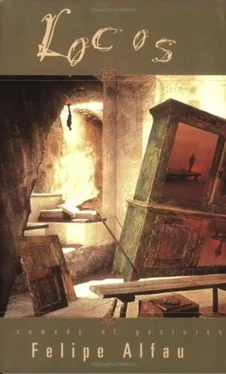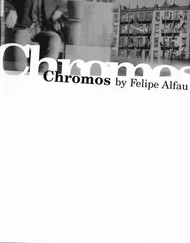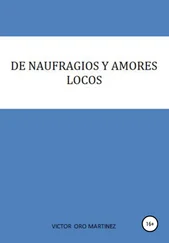Dr. de los Rios, who knew Cendreras, told me that he left him the following message for her:
“Tell her that I had to leave her because I felt insanity close upon me.
“Tell her that I loved her more than anything in the world but that love is life and everything with her is death.
“Tell her that every time I saw her coming down that lonely corridor in the house, I felt the chill of fear in my marrow.
“Tell her that she was beautiful but that every time she embraced me I felt as if my grave were closing upon me.
“Tell her that our marriage was never consummated, that in the most intimate moments at night, whenever I approached her, I saw the jealous hands of her dead husbands rising from a black abyss to defend her from me.
“Tell her that in those moments her eyes were the most beautiful I have seen, but that they sent me away by their unearthly expression. That I knew that my intentions were sacrilegious. There was such a mixture of mockery and sadness in those eyes. ! As if they were reminding me that she did not belong to this world. And perhaps that saved me from a complete union with death.
“Tell her that during her death spells I roamed about the house like a madman, that it was like living with a corpse, and that every time she came back to life, if I made an effort to address her cheerfully because of her recovery, she looked at me with that expression of mockery and sadness as if saying: Do not forget yourself, because some day you will be stiff and dead.
“Tell her that every time she looked at me, I saw myself dead in her eyes.
“Tell her that I left her while she was dead because otherwise she would have held me with her strange fascination.
“Tell her that I fled from that house of death never to return, but that I shall never love another. That she has awakened in me the germ of death which is dormant in every living being.
“And tell her that I will see to it, that when I die my corpse shall be sent to her.”
And then Dr. de los Rios said to me:
“Everything about that woman is dead and anyone living with her would die soon. Death is a contagious disease that kills. With her it has become endemic and periodic. She dies often but death cannot kill her completely. There is no better antidote for death than death itself. Anyone about her would have died.”
“But then what about her old maid? She lives.”
“She is too old, she is no longer emotional, she is past the danger point. Yes, she is too old; death has missed her. Like most old people she will not die, she will just fade away.”
“And yet, doctor. Doña Micaela married three times. After all, that is a sign of life. Marriage, I understand, is the consecration of an act of nature, of life, of love.”
“I don’t know about that. Most things are consecrated after they are dead and perhaps she felt that. She felt that marriage killed that thing which is one of the clearest symbols of life. Three men yielded to her attraction in spite of that something about her that kept everyone from her; and to the three of them she put the same condition of marriage, the same death condition. Two of them paid with their lives and Cendreras only deferred his payment. He died not long after, the victim of a gruesome murder; but his body could not be sent back to Doña Micaela, as he had promised, because only part of it was found and this in installments, and besides the law objected.”
“But was she in love with her husbands?”
“I don’t think so. What she loved in them was their corpses. She was in love with Death and I think she sacrificed them as a tribute to him. You know? I do not think she ever consummated any of her marriages. I gathered that from her third husband. She was always true to death.”
And one day Dr. José de los Rios took me to the house of Doña Micaela Valverde, who was under one of her death spells.
When we arrived the maid received us. She greeted Dr. de los Rios with affability and said:
“There she is in her room, dead. You know where her room is.”
There was great indifference in her gesture and her sentence rang with a broad, tragic humor in the lonely house.
We advanced through a corridor illuminated by a window at one end which projected our shadows in our path. We advanced, pushing our shadows ahead until they met the opposite wall and began to creep upward. They rose menacingly before us, but, as we approached them, they shrank. At the end of that corridor was the chamber of Doña Micaela Valverde.
The room was quite dark. I saw faintly the outline of her body upon the bed. Dr. de los Rios circled around her and threw the curtains aside. The room was illuminated by the yellow light of the late afternoon. It was quite dismantled, with scarcely any furniture and this covered with dust. The empty walls were dirty and showed cracks in several places. There was also a thick layer of dust covering the glass of the window, which was closed. This made the yellowish light fainter and colder.
Doña Micaela lay in her bed completely covered, head and all. Dr. de los Rios threw the sheet aside and exposed the dead woman. We both looked at her for a long time. Her eyes were open and in them the frost of death was evident, but they held that strange, deep beauty which characterized them and were surrounded by dark circles leading toward her temples, where they were lost in her hair which lay dry and ashen on the pillow.
On the wall at the head of her bed there was an ivory crucifix upon a black cross, bending over the dead woman with infinite clemency.
Dr. de los Rios remarked:
“Her servant forgot to close her eyes this time.”
“They are beautiful,” I said.
And Dr. de los Rios repeated:
“Yes, they are beautiful.”
I remained silent, studying her naked body. Then Dr. de los Rios spoke again:
“I tell you, this is death and nothing else. This woman has been dead a month and will probably be dead for two more.”
And he gazed wistfully upon the dead woman and recited in a melancholy voice:
“The ominous thunder will storm the distance only to die unheard in the faint tremor of her eardrums.
“The scorching sun will surmount the meridian over her in silence, without extracting a single responsive drop of sweat, to congeal upon the glaciers of her eyes.
“The dazzling stars of the nights will be put out as they drop like gouts of light in the absolute emptiness left by her soul.
“The blood-red dawn of the days will pale and fade upon her livid corpse.
“And the brilliant cavalcade of happiness will grow quiet when passing her and disperse in listless futility under the great dense pall of her negation.”
And then Dr. de los Rios produced a bistoury and with brutal resolution inflicted a deep wound in her thigh.
“Look!” he said and showed me the frozen wound without a drop of blood
“Touch!” he said, and pressed my reluctant hand against her ice-cold flesh. I withdrew it quickly as another sad scene flashed through my memory, and then looked at the crucifix whose head hung with graceful resignation.
Dr. de los Rios continued:
“These are not absolute proofs, but they are the emotional tests for the layman. I have taken the scientific tests and I tell you that she is dead. When she revives, she will have no memory of her condition, all sense of time will be lost. She will think that she went to sleep a moment ago, but she will have vague feelings of what has taken place, a feeling that is unmistakable. She will sense the grip of death all over her like an echo. She is a specialist and she can tell. She will say that she has been dead and she will be right.”
“But this is absurd!” I exclaimed. “If she has been dead a month, how is it that putrefaction has not set in?”
Читать дальше












